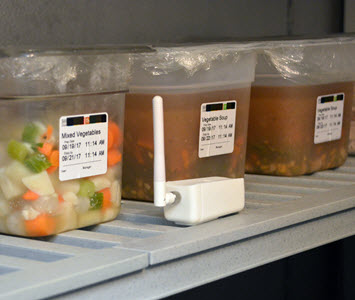What We Need to Know about Freezing Food
Posted on 25th Jan 2018

All throughout the year, consumers regularly toss leftover food in the freezer, planning to reheat and enjoy them later. But freezing leftovers may not always be safe. In fact, it can be hazardous, for both consumers and those in the foodservice industry serving hundreds if not thousands of people.
To better understand the finer points, as he calls them, about freezing food, we turn to Chris Jarvis, Product Director at Hawk Safety, which is now part of the DayMark Safety Systems family . According to Jarvis, here are some things about food freezing we need to know:
Does freezing protect food?
This question is so important that we have a separate blog on our site just discussing this issue. As we discussed in that blog, and as Jarvis concurs, the answer is no. “Freezing does not destroy bacteria in food. Instead, it reduces the activity levels of bacteria to near zero and stops them reproducing to harmful levels.” And while the freezing process will help make food last longer, “it’s important to remember that bacteria in food will multiply rapidly as soon as it starts to thaw out.”
What foods can we freeze?
We should turn this around. What we need to know is what foods should not be frozen. These include eggs, watery greens such as cucumbers and celery, creamy sauces, and soft cheese. “Foods that contain a large amount of water will spoil either in the freezer or after defrosting,” he says.
How long can we freeze food?
Jarvis suggests we follow guidelines published by the US Department of Health and Human Resources. Here are their recommendations on a few everyday food items:
- Salads: Do not freeze well, not recommended
- Hot dogs (uncooked): One to two months
- Bacon: One month
- Sausages: For chicken, turkey, pork, and beef sausages, up to two months
- Ground hamburger: Up to four months
- Steaks: Six to twelve months
- Chops: Four to six months
- Roasts: Up to twelve months
As to leftovers (meat, poultry, chicken nuggets, even pizza), the length of time the food item can be stored varies, but typically is from one to three months.
We should also note that these recommendations assume the freezer is at 0 degrees or below. To be on the safe side, food service professionals should have sensors and temperature monitoring systems installed to ensure temperature settings and food safety.
How soon can we cook frozen food?
Food should be thoroughly thawed before cooking. “This is because frozen food takes a lot longer to cook through; you may find that the outside of the food burns before the inside is cooked,” explains Jarvis. He also adds that food can be safely defrosted if placed under cold running water or in a microwave using the “defrost” setting. However, once defrosted, it can spoil quickly, so it should be cooked as soon as possible.
Can food be refrozen?
This is a question that comes up frequently among both consumers as well as some food service professionals. Fortunately, Jarvis provides us with a decisive answer: yes and no.
If they have been thoroughly cooked—this is key—formerly frozen meats and fish can be frozen again. Once cooked, according to Jarvis, most of the dangerous bacteria have been destroyed, which allows these items to be frozen again.
However, food items such as bread, dairy products, and even vegetables will likely degrade if refrozen and will no longer be edible.
For more information on the Hawk Safety technology and how to keep food safe and healthy, contact DayMark at 800-517-0490.


